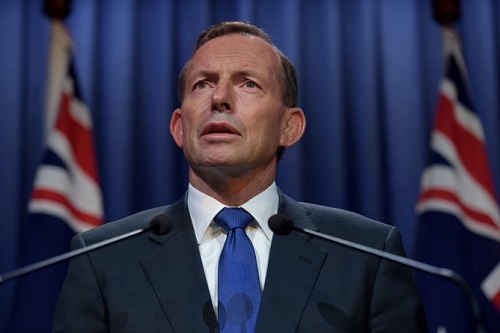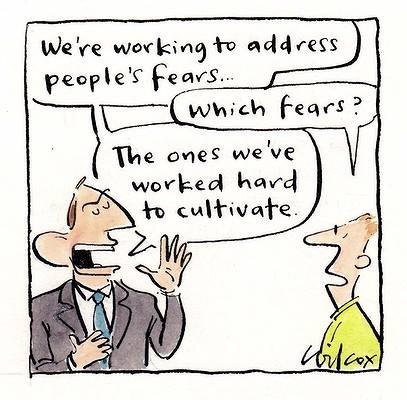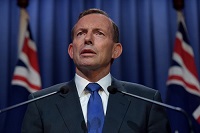
The tricky thing about Man Haron Monis and the Lindt Café siege, is that he acted alone and was taken rather as a harmless buffoon by the security agencies. The terror threat from random actors is very real. Annabel Crabb says that
It’s clearly an escalating threat situation. Anyone carrying on today about how Tony Abbott is just cooking it all up to save his own skin is thinking wishfully.
She says that there are now:
Four hundred current investigations by ASIO, sixty-two new biometric screening gates to catch people travelling on false passports, forty-nine extra AFP officers across Sydney, Melbourne and Canberra working on the problem of Aussie jihadists abroad, and so on.
Certainly Abbott is playing to a political strength. Newspoll tells us that 51% think Abbott is best at handling the nation’s security, whereas 31% go for Shorten. 7% say neither, and 11% are uncommitted.
What the Government intends to do was spelt out on Radio National’s PM:
- There will be a national counter-terrorism co-ordinator “to bring the same drive and focus to this as we’ve brought to Operation Sovereign Borders.”
- On immigration a harder line will be taken to “keep out people with security questions over them.”
- “The Government will develop amendments to the Australian Citizenship Act so that we can revoke or suspend Australian Citizenship in the case of dual nationals.”
- The Government is looking at “suspending some of the privileges of citizenship for individuals involved in terrorism.” Privileges susceptible to suspension could include “the ability to leave or return to Australia”, “access to consular services overseas” and “access to welfare payments”.
- The Government will take action against hate preachers by “enforcing our strengthened terrorism advocacy laws” including “new programs to challenge terrorist propaganda and to provide alternative online material based on Australian values, and it will include stronger prohibitions on vilifying, intimidating or inciting hatred.”
- Muslim community leaders should speak up more. When they talk about Islam being a religion of peace that they should mean it.
All this doesn’t actually amount to much, according to Annabel Crabb, apart from enforcing existing laws and some blowhard (my term) urging.
Bill Shorten offered bipartisanship, saying that Labor would “engage constructively” with the government but counselled:
Haste and confusion is never the friend of good, sensible security in the future.
Abbott had also said quite explicitly that individual liberties might have to be sacrificed to ensure the safety of the community.
According to Grattan:
Shorten said there always should be a strong presumption in favour of individual liberty. “This presumption should only be reduced, rebutted or offset to the extent that current arrangements are proven to be inadequate.”
I’m concerned about what Abbott and Brandis might do in returning to section 18C of the Racial Discrimination Act. Frankly I’m concerned about anything Brandis does after getting out of bed.
I’m concerned about revoking citizenship. Once people are Australians, we should take responsibility for them rather than shunt them to a different jurisdiction, or virtually render them stateless.
Sangeetha Pillai argues that there’s more to be lost than gained in stripping citizenship. She says that most of what is proposed that is achievable can already be achieved by other means. In other words existing laws suffice. She says “commentators have been quick to note that amendments along these lines carry the risk of exacerbating feelings of social disaffection that can underpin extremism.” Her bottom line:
The limited potential effectiveness of the proposed measures, combined with the challenges of implementation and the possibility for them to be counter-productive, suggests that the losses may outweigh the gains.
I’m concerned also that there might be hassling of Muslim’s and consequent increased radicalisation.
Abbott’s words about Muslim community leaders were, according to Michelle Grattan:
“I’ve often heard Western leaders describe Islam as a ‘religion of peace’. I wish more Muslim leaders would say that more often, and mean it.”
Shorten and Julie Bishop were quick to distance themselves from these remarks. One Muslin community leader suggested that Abbott should engage in anything he chose except politics. I understand that some community leaders declined to attend a special briefing.
Randa Abdel-Fattah has a fine piece on the ABC religion and Ethics site:
Flanked by a row of Australian flags, Tony Abbott, like a priest performing a rite of passage, formally inducted Australian Muslims into the category of Australia’s primary Other.
The Prime Minister’s stated intention was to provide the nation with clarity and reassurance – just in case the decade-long stream of moral panic, manufactured fear and Islamophobic sentiment had left Australians in any doubt as to who successive governments deem as “un-Australian.”
In a way, the Prime Minister has done Muslims a favour. For he has made explicit what is at the heart of this government’s war on terror (picking up where previous governments left off). It has never been about targeting a radical minority or national security per se. The real struggle is to re-configure our social, discursive and symbolic relations around a politics of us and them.
There are many tragic consequences to this state of affairs. But at least the government has now laid bare the fact that it is prepared to hold social cohesion, justice and national security to ransom in its war on terror.
I’ll finish with this Wilcox cartoon from August last year:

I’m sorry, Annabel Crabb, the problem’s for real, but Abbott isn’t – not entirely. Guy Rundle says Abbott should act like a statesman. It seems to be beyond him.

